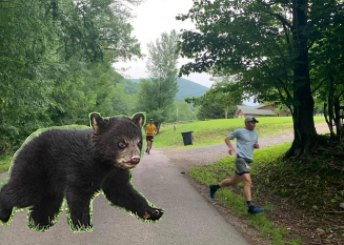Stream of consciousness guidance for a stellar Highlands Sky
/For those of you that might be doing West Virginia’s best trail race this weekend, here are some thoughts I sent to one of my coached runners about how they might approach things a little differently this year. It’s specific to them, so YMMV and remember what they say about free advice.
In case you missed it and like to suffer through mediocre race reports, I’ve written about Highlands Sky before, because I love it just that much. Otherwise, I wouldn’t have done it five times so far!
A report filled with grape jelly
And that time I ran easy having Lyme disease but not knowing it yet
And the race I went out way too hard and may or may not have rallied
Rule #1: be ready to Dodge the giant baby bear cubs or be prepared to run using an arm as a leg
The email:
Pacing in the first half is the most critical feature. Looking at your race from last year it looks like you did a really great job of pacing it overall. You negative split the second half (14:00/mi vs. 13:00/mi) and that's great. There's no heart rate or power data so it's a little hard to extrapolate at times. Looking at the GAP paces, I do suspect you could have still slowed down another 30-60 seconds per mile on the first major climb. Over 6 miles that's a measly 6 minutes lost. You'd be fine to slow up even more if you fuel correctly, which is also part of the point of slowing - so you can eat more.
There doesn't need to be any sense of "digging" into higher intensities (mid zone 4 or higher) in the first half, especially not for several consecutive minutes. However, the climbs and excitement make it very easy to get higher than mid zone 4 so you have to emphasize discipline and patience as much as possible - so you can use your fitness in second half. The first half decides if you put yourself in a place to succeed. Seconds per mile gained in the early going become minutes lost in the later miles but it doesn't look like you tanked your pacing at all.
The more you can settle into an aerobic effort and run your own race in the first half, the more likely you will be able to dig a little deeper in the second half. However, that's still with the caveat of having had decent nutrition in that first half. The harder you go early, the more glycogen you deplete that will become critical later on.
I like to think about being proactive and very much in control of the nutrition/hydration and pacing as long as possible instead of needing to become reactive when you start to bonk or feel generally bad. "I'm pacing now to have something left for the final climb up the ski slope." "I'm eating now so I can feel great on the road across the sky." Being proactive usually aligns with being comfortable as long as possible.
That gravel road section is mentally difficult for many people so if you come into the aid at the beginning of road across the sky feeling decent, you can fuel easily for that next stretch and consistently from that point on to Bear Rocks, get a relaxed rhythm through it and pass some people. Same with the last road section - save something for it and you can pass people and cut off more time. It's worth remembering the final part of the gravel road is uphill. It also feels like that last mile or so takes forever as a result but if you expect that feeling as you start it, no big deal, it's normal. Plan to walk a little on the biggest gravel rollers and steepest climbs on the northern *hot ass savannah.*
It's very easy to run that course like it's the "Bear Rocks Marathon" (which I am going to trademark) and while that's a nice distance, Highlands Sky is 40ish miles so 13 miles of distance past Bear Rocks for suffering is really tough. Still, it didn't look like you completely tanked in that open northern section but I would guess probably a little more suffering was had coming down Raven Ridge Trail since your pace slows there. Much of Raven Ridge is non-technical enough that you could make up some serious time if you have the legs left.
And remember you can always bounce back if you start to struggle if you can keep the calories coming and keep your body temp down. If you've bonked or even started to feel that dizzy hypoglycemia, I like to think about getting about double the calories to get back on track and shortening the time frames between eating.



